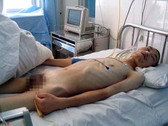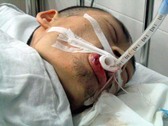Police arrested Mr. Li Guoshun, a practitioner from Longyan City, Fujian Province, on August 23, 2004, and charged him with distributing Falun Gong materials. He went on a hunger strike to protest but was ignored by the police and the prison hospital staff. He died on October 14.
The following report shows that the police and local officials willfully delayed Mr. Li's treatment. They had total disregard for human life, covered-up their actions, and tried to shirk their responsibilities.
Mr. Li Guoshun began practising Falun Dafa in 1996. He and two other practitioners went to Beijing to appeal for Falun Gong in 2000. They were arrested and brought back to Longyan City, where police sentenced them to one year of forced labour. He stayed in Longyan City after being released in 2001 and continued to distribute flyers clarifying the truth about Falun Gong. Police officers broke into his house in the city, arrested him, and confiscated his Falun Gong books and truth-clarification materials. Li went on a hunger strike. At his mother's request, he was released on probation to remain at home and await his trial. On February 28, 2002, the town police station arrested him at his mother's home. They found Falun Gong books and 80 packages of truth-clarifying materials in his room. Officials issued a non-court document ordering him to a forced labour camp for two years.
During his forced labour sentence, Mr. Li continued to practise and to tell people the facts about Falun Gong. He guided several inmates to begin the practice. His sentence was extended for a month because of several attempts to escape. After his release in 2004, he went to his uncle's in Tianjin City to work. The police used all sorts of means to find his uncle's phone number and harass them. They claimed that it was due to pressure from their superiors and demanded that Mr. Li return. Not wanting to affect his uncle's business, Li decided to comply and went back.
 |  |
| Before the emergency rescue | After the emergency rescue |
The photo before the rescue was taken around October 4 or 5; the one after the rescue was taken on October 7
Mr. Li was reported and arrested with another practitioner when they were distributing truth-clarifying materials around 10:30 p.m. on August 23, 2004. Li went on a hunger strike. On August 28, the jail notified the Baisha Town Office to tell Li's family to come and ask him to eat. His mother filed a petition for his release on probation but was rejected. The jail said that, since it was Li's third arrest, they could not release him anymore. On September 8, when Li's hunger strike had gone on for 15 days, the jail sent him to the Minxi Jail Hospital for emergency treatment. On October 3, the hospital notified the jail that Li's life was in peril. At 5:30 p.m. they transferred him to the City Second Hospital. The hospital found Li already in a coma and diagnosed vascular cirrhosis, indicating that the jail hospital had not given Li proper treatment. All of his organs were failing. They immediately issued a pending-death notification. According to family members, Li was only skin and bones when he was transferred to the Second Hospital. His limbs were very cold, and his hands were cuffed under the sheet. He was not wearing underpants, and his hips were red and ulcerous, probably due to prolonged contact with a urine-soaked bed. From October 3-5, the hospital did little or nothing because there was no money in his account, even though his family members had turned in over 1,000 yuan to the hospital and had tried to negotiate with the people on duty in the jail. The jail personnel not only failed to report the matter to their managers, but also verbally abused the family. On October 6, hospital officials told the family members that Li would not live past 6 p.m. without an emergency operation. The family went to talk to the jail management directly. The jail then opened an account with the hospital and guaranteed the funds, although the guarantee was rescinded after one day. The hospital began the emergency operation at 3:30 p.m. Eight days later, on the morning of October 14, Li passed away after enduring over 50 days of misery. The family members he left behind were extremely sad, especially his mother, who was hospitalized for many days because of the traumatic experience.
Mr. Li did not get effective medical treatment while he was in the jail hospital. He did not get the proper emergency treatment in time while he was in the City Second Hospital. Beginning on August 28, his mother had repeatedly requested his release on probation to await his trial outside, but her requests were always rejected. When Mr. Li was dying on October 4, people from the court went to the Second Hospital to try to force the family members to sign for his release on probation. The family members refused. On the afternoon of October 6, the town police station called his family members to tell them that the police would handle the probation process for them. The family members warned the police adamantly that whoever signed the release would have to take full responsibility. The police gave up. They had failed again in their attempt to shirk their responsibility. On the evening of October 8, managers from five separate government offices, including the city, district, and town, the district police department, and the court, all went to the hospital to visit Mr. Li. A photographer even came to take pictures. At 10 p.m. that night, the Xinluo District People's Court in Longyan City, Fujian Province, delivered to the family members a "Decision on Monitored-Living" and a "Sentence." The "Sentence" dictated that the case, overseen by Chief Trial Judge Chen Ying, Trial Judge Zeng Hongbin, was closed. On the morning of October 9, people from the jail, delivered the release paper to the hospital and asked the family members to sign it. They refused, because they knew that it was purely so that the police could evade their responsibility. On the morning Mr. Li died, a special team headed by Jian Zhanyue, the deputy director of the district political and justice directory, called a meeting to discover and record the family members' demands. The proceedings were videotaped. Both the autopsy and the special team investigation reports stated that Li died solely of internal organ failure caused by the hunger strike and placed all blame on Li himself. This was a blatant attempt to escape being held responsible and to cover up their inhuman acts. According to an lawyer, the jail cannot avoid being held responsible even if a person commits suicide during his detention, not to mention dying of hunger. In addition, neither hospital responded to the family members' requests to provide the autopsy report and records of Li's hospital treatment. (The jail hospital records could not be obtained because the hospital is closed to the general public. The Second Hospital records could not be accessed because the police department sealed them.) Even the report by the investigation team was submitted orally, and no written documentation whatsoever was presented to the family. The family members went to talk with the officials in the jail, the district police department, and the court. All of the officials ignored them, claiming that Li Guoshun, was no longer under their jurisdiction. The family members are powerless in this situation.
Chinese version available at http://minghui.ca/mh/articles/2004/12/26/92209.html
* * *
You are welcome to print and circulate all articles published on Clearharmony and their content, but please quote the source.










 more ...
more ...